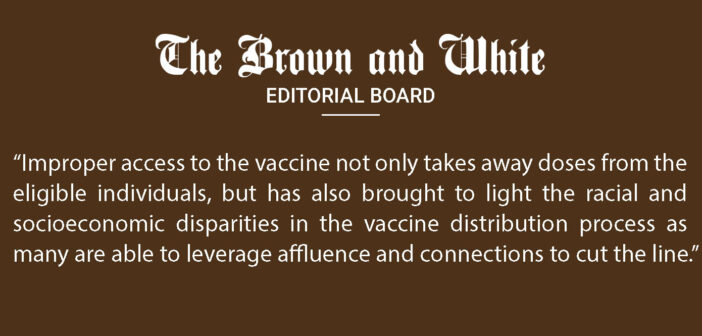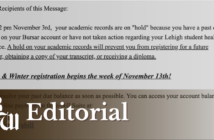The COVID-19 vaccine rollout is well underway with over 72 million vaccines administered in the U.S. since Dec. 14.
The U.S. has used a phased approach for vaccine distribution, with intentions to provide first for those in highly at-risk groups.
In Pennsylvania, we are still currently in the first phase of distribution, Phase 1A, which includes long-term care facility residents, healthcare personnel, people 65 and older and people between the ages of 16 and 64 with high-risk conditions.
And while many who meet this criteria have been able to get the vaccine, the process has not been seamless. Meanwhile, many young individuals have been able to bypass the line despite not falling into the first phase.
The system in place for the distribution doesn’t prevent people from lying about their eligibility— there is no need to show proof of having a high-risk condition, or being healthcare personnel. All one has to do is check a box saying they meet one of the requirements, and with a bit of luck, oftentimes find themselves vaccinated.
In such desperate times, when people want nothing more than life to go back to “normal,” get vaccinated and feel safe, this system that essentially runs on an honor code, is begging to be broken.
And that’s exactly what has happened.
On the Pennsylvania Department of Health’s website, a “Your Turn Vaccine Eligibility Checker,” is all it takes to be directed to your nearest vaccination site, making the ability to deceive come at much ease.
There’s a phased approach for a reason. However, not everyone will act in the morally correct way and wait their turn in line—if people see they have the opportunity to get the vaccine, they are going to act upon it.
It is extremely important that people get vaccinated when it is made available to them as each vaccinated individual brings us one step closer to herd immunity.
However, as a younger, lower risk population, responsibility falls upon college students to ensure priority is given to those whose lives are at greatest risk.
Improper access to the vaccine not only takes away doses from the eligible individuals, but has also brought to light the racial and socioeconomic disparities in the vaccine distribution process as many are able to leverage affluence and connections to cut the line.
In Pennsylvania, according to vaccination data, white people make up around 46% of the people who have been either partially or fully vaccinated in the state. Whereas African Americans, Asians, Pacific Islanders and Native Americans each have less than 3% of their populations vaccinated.
Pennsylvania is ranked number 45 out of the 50 states in its vaccine rollout efforts. As of Feb. 28, the state has received 3,647,105 doses, but has only administered 2,489,919.
The distribution across Pennsylvania counties is also extremely inequitable—counties with large populations are getting less doses of vaccines than counties with smaller ones.
According to the Philadelphia Inquirer, Chester county is ranked sixth in terms of population in Pennsylvania, but 33rd out of the doses received across the state. This shortage has delayed 100,000 people from getting the vaccine.
Local legislators are calling for accountability from the government on both state and federal levels to improve the system so that there aren’t places with a vaccine shortage and others with a surplus.
In order for this vaccine to be properly distributed, there needs to be a mandated truth-telling process in place nationwide.
States need to improve how they inform citizens on accessibility and eligibility.
And across the country, there needs to be one unified strategy to make sure it is evenly and equitably distributed. These vaccines are all too valuable to just be thrown away, and someone who is eligible shouldn’t not be able to get it just because of where they live.
Resources that seem to be the status-quo, like internet access and transportation, severely prevent at-risk populations from receiving proper information and inhibit the ability to be vaccinated.
It is our hope that people will act morally, think beyond themselves and will not take the vaccine before it’s their turn.
We all want to be vaccinated and we all want this pandemic to subside, but by vaccinating those who are more at risk first, we have a better chance of minimizing further tragedy fatalities in the U.S.
Please, for now, wait your turn.






Comment policy
Comments posted to The Brown and White website are reviewed by a moderator before being approved. Incendiary speech or harassing language, including comments targeted at individuals, may be deemed unacceptable and not published. Spam and other soliciting will also be declined.
The Brown and White also reserves the right to not publish entirely anonymous comments.
1 Comment
I appreciate the article, but I’m not sure how controversial your stance is- I think we all want our peers to act more justly. I would have appreciated it more if you took on the more daunting issue: “if offered a vaccine, regardless of your circumstances, should you take it?”. Vaccine- and healthcare- inequities warrant investigation and intervention; having access to quality healthcare is fundamental to all American’s success. But if one has the opportunity to receive a vaccine, he/she should take it. The ultimate goal is herd immunity from the virus, and achieving a critical mass of vaccinated individuals will be the only way to get there.